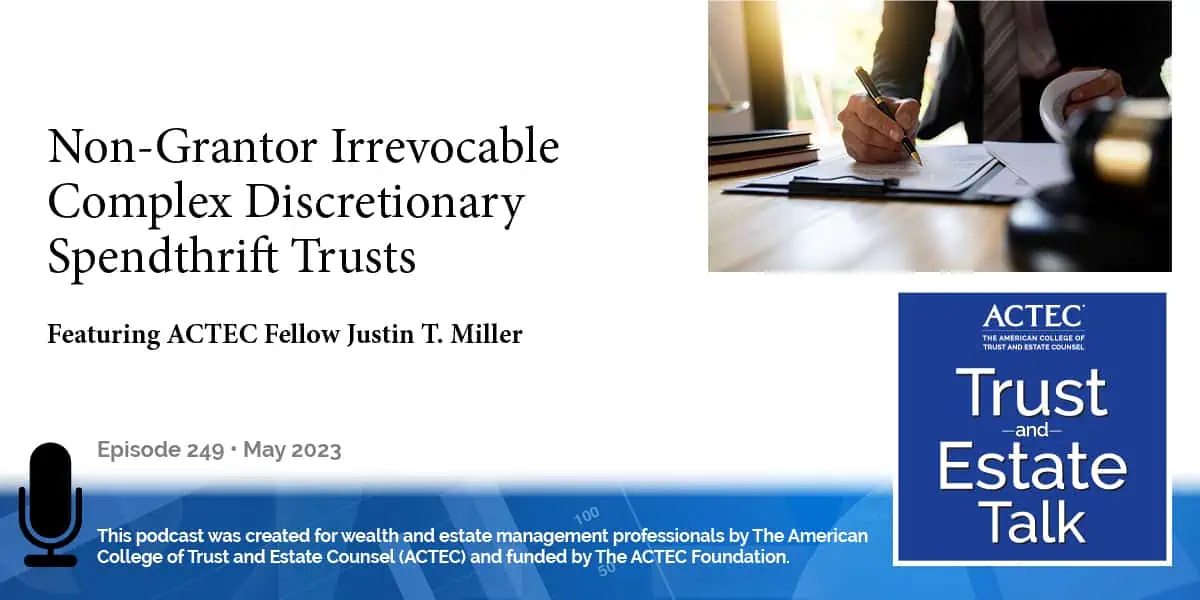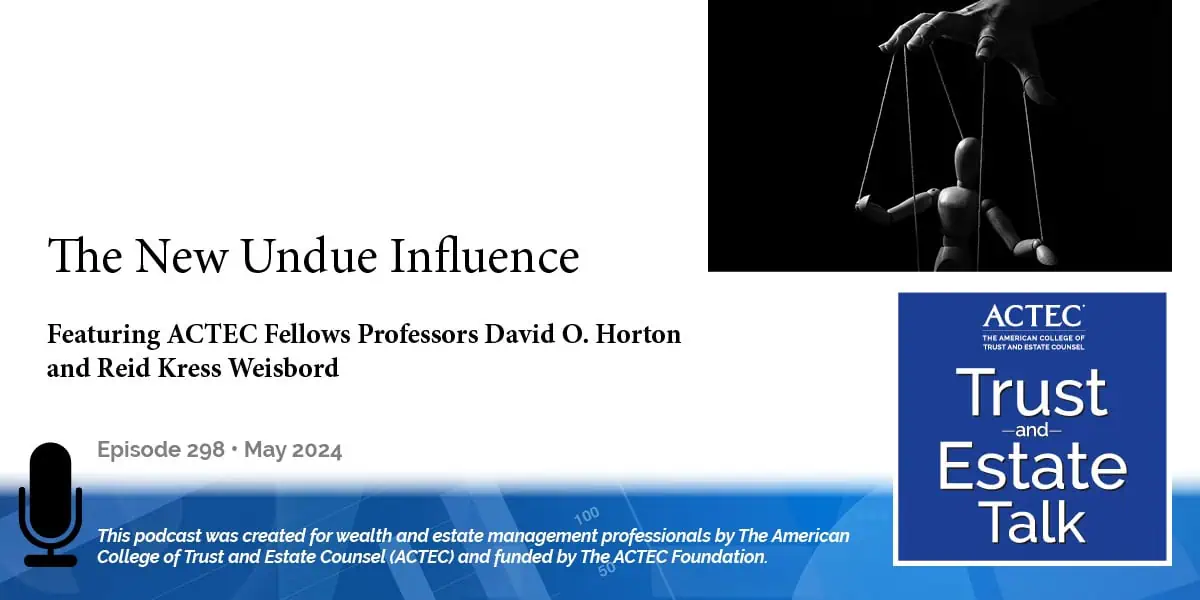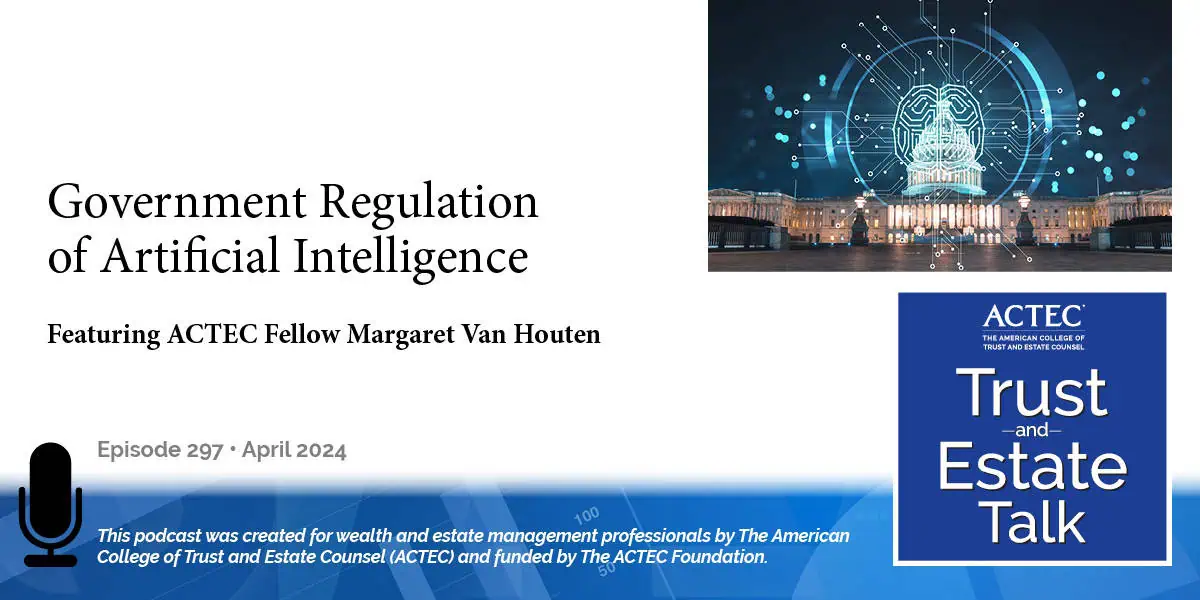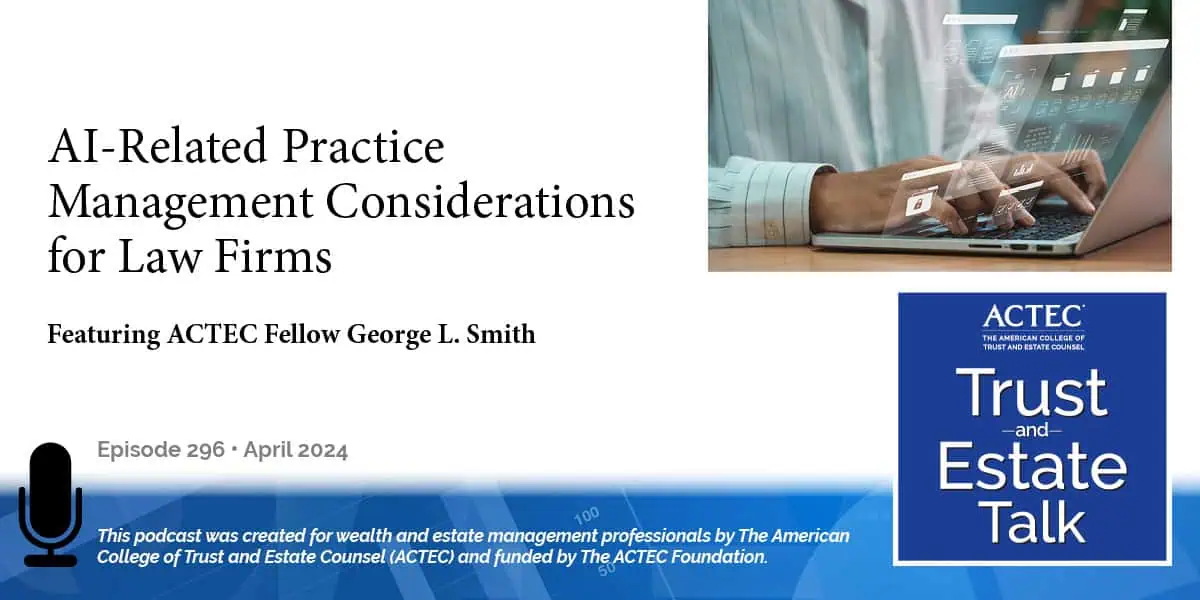Non-Grantor Irrevocable Complex Discretionary Spendthrift Trusts

Transcript/Show Notes
This is Travis Hayes, ACTEC Fellow from Naples, Florida. Many shams and scams are being marketed online around trust structures, including “Non-Grantor Irrevocable Complex Discretionary Spendthrift Trusts.” Estate planners need to understand the tax and fraud risks related to these types of questionable trust structures. ACTEC Fellow Justin Miller of San Francisco, California joins us today to break it all down. Welcome, Justin.
Introduction to Non-Grantor Irrevocable Complex Discretionary Spendthrift Trusts
Thank you very much, Travis. As Travis said, I will be talking about “Non-Grantor Irrevocable Complex Discretionary Spendthrift Trusts” – try saying that five times fast. Let’s talk about how those types of trusts are being used appropriately, and then let’s talk about how those types of trusts are potentially being abused. So, I’m going to start from the beginning with the non-grantor; can you do a Non-Grantor Trust? And the answer is absolutely “yes”!
There’s Subchapter J of the Code as long as you don’t have any of the triggers, what we call “grantor trust triggers” under Subpart E of Subchapter J, you can create a non-grantor trust. Clients do this all the time, especially to take advantage of things like qualified small business stock under Section 1202, possibly to avoid or defer state income taxes by having a non-grantor trust in a state without state income taxes. So, we know we can do a non-grantor trust.
What about an irrevocable trust? Of course we can do an irrevocable trust. Clients do this all the time. This is basically a trust that they can’t revoke. Usually, when you’re doing estate planning for multiple generations – children and grandchildren – you’re going to do an irrevocable trust. What about a complex trust? Now, complex could mean a couple of things. It could just mean is it complicated or a very difficult trust. Of course, we can draft those and see those types of trusts all the time. But complex is actually a term of art. Complex simply means it’s a trust that’s either not required to distribute income, at least annually, or it’s a trust that actually makes a principal distribution to either a beneficiary or makes a deductible distribution to charity. So, we have complex trusts all the time.
What about discretionary trusts? Of course, trusts can be discretionary. That just means you’re giving some sort of discretion to the trustee on how much money they’re supposed to give to the beneficiaries in any given year. Discretionary trusts are out there all the time.
And last but not least, what about spendthrift trusts? Spendthrift basically means you’re setting up a trust and it’s there to protect against creditors. The idea is that you have a client, or one of you is going to be setting up a trust for your children, for your grandchildren. And the idea is you don’t want creditors to get a hold of that money. You can have special spendthrift provisions in there to protect them from creditors.
Trust Shams and Scams
So, all of those terms alone or even combined are the type of planning that good attorneys do all the time. So, how are they being potentially abused? How might they fall into the category of what I like to call “shams, scams, and no-thank-you, ma’ams”? So, this is where you have to be careful about what you might read. There’s a website out there called Google. I don’t know if anyone’s ever used that, but if you search for these terms, there’s a lot of promotional material out there that could steer you in a very bad direction. We’re also seeing these pop up on social media. This is Twitter, TikTok, or even LinkedIn.
So, how are these strategies potentially being abused? Well, if you look at some of the internet material, social media material, and promotional material, it seems like these are legitimate structures. Even some of these structures have been theoretically copyrighted over multiple years. There are claims that there are tens of thousands of these out there in existence. They claim that attorneys and accountants and other folks have worked on these types of structures. So, we know we can generally do it, but what are the legal opinions, the so-called legal opinions, saying that they can use these trusts for?
And here’s where it gets not necessarily correct. So, what is being claimed is a few things: one is that by doing these trusts, you can either completely avoid or at least defer capital gains taxes. The argument is made that if you set one of these trusts up, creditors can’t get to it, even if you set it up for yourself or if you’re the one primarily funding it. And let’s talk about why that doesn’t necessarily work. Why do these types of trusts not really avoid federal income taxes? And why do these types of trusts not necessarily protect you if you’re the one setting it up from getting creditor protection?
Complex Trusts: Asset Protection and Uniform Voidable Transactions Act
So, let’s start with what we’ll call asset protection. Now, if you’re in a special state, what we call an Asset Protection Trust jurisdiction, an APT jurisdiction. Generally, if you’re in one of those APT states, they may allow self-settled trust, meaning you can set up a trust for yourself and get asset protection. But many states do not have that rule. Many states have a rule that says if you set up a trust for yourself, you are not protected from creditors if you’re setting this trust up to benefit yourself.
Now, what if it’s a third party? What if your parents set up a trust, but you’re the one funding it? It’s the same thing. You’re still self-settled. It’s your money going into it. You can only protect other people and third parties when you set up the trust. If you’re not in one of those special APT states, you’re not going to get protection for self-settled. In fact, in certain states that have already adopted the Uniform Voidable Transactions Act, the UVTA states like California, it makes it even easier for creditors to recover those assets that you’ve transferred, whether it’s to a trust that you set up or to a trust that someone else set up for your benefit.
Complex Trusts: Creditor Protections and Tax Claims
Even if you have no actual fraud or improper intent, you still might have those assets subject to creditors. Not only that, if those assets are subject to the rights of creditors, it’s not a non-grantor trust. It’s a Grantor Trust, meaning you’re paying the taxes on it. So, unless you’re in one of those special states, you cannot do this and get your creditor protection. Creditor protection comes when you fund and set up a trust for somebody else.
Now, what about the tax claims? What about the possibility of avoiding tax? Where do they even come up with that argument? Well, let me read to you straight from our Internal Revenue Code. I’m going to start with Section 643(a)(3). 643(a)(3) specifically says, “[g]ains from the sale or exchange of capital assets shall be excluded to the extent that such gains are allocated to corpus.” It says right there in the Code, gains from the sale or exchange of capital assets shall be excluded. It goes on in Section 643(a)(4) to say, “[t]here shall be excluded those items of gross income constituting extraordinary dividends or taxable stock dividends.”
So, the claim in a lot of promotional material, social media, is that: “Hey, if you set up these trusts, you don’t have to pay tax on capital assets or capital gains. You don’t have to pay tax on extraordinary dividends or taxable stock dividends.” Now, why is that not correct? It says it right there in the Code. Well, the reason it’s not correct is because you have to understand how the Code works. Subchapter J is very, very tricky. There are a lot of rules. There are a lot of rules and exceptions to rules.
Complex Trusts: Income Tax and Distributed Net Income
And what you have to understand is Section 643 isn’t talking about whether something is taxed or not taxed, what it’s talking about is a concept called Distributable Net Income or DNI. What I like to say is DNI is only slightly less complicated than DNA. So, it’s no wonder people are getting confused about this. What DNI is telling us – what Section 643 is telling us – is whether those capital gains or that other type of taxable income, whether it should be taxed at the trust level or the beneficiary level. It’s not telling you that the taxes disappear. This is one of the most common errors when you have people involved with the income taxation of trusts or estates.
There are three definitions of “income”. You have taxable income that we’re all used to as individuals. We have a distributable net income, which is a special concept to determine does the trust pay the tax or the beneficiaries pay the tax. And we even have another definition under state law, fiduciary accounting income, and that just determines what’s considered income or principal for purposes of distribution.
Now, you might say, how’s the IRS ever going to find out? Very rarely are these 1041s, which are your income tax returns for trusts or estates, very rarely are they audited. In fact, the audit rate is pretty much close to not the top 1%, but we’re talking about 0.1% being audited on a regular basis. Well, here’s the problem for people that are playing the audit lottery. Not only could the IRS find you, but if they find any of the promoters that are selling you on this type of structure and you’ve purchased this type of product from them, whether it’s correct or not, it’s possible that you will show up on that list and there could be not only back taxes owed, but potentially some large penalties and significant interest. So, we just have to be very, very careful, and make sure you’re working with a good advisor.
Closing Thoughts
And I want to close with this: it’s no wonder these mistakes are being made out there. This is very complicated material. Now, you might say everything being said about this. Will artificial intelligence make it any better? Could that solve the problem? Can we just use artificial intelligence to check to see if that works? I went ahead and tried it: ChatGPT. I actually put in there a question, a simple question. I already knew the answer to it. Can a non-grantor trust be used to defer income taxes? It’s one of those claims – defer or avoid. Even artificial intelligence got the answer wrong. They’re doing the same Google search as you. All this information is popping up.
According to Chat GPT, artificial intelligence tells us: “Yes, you can do a non-grantor trust that can defer income taxes.” In fact, it goes on to tell you about doing a Grantor Retained Annuity Trust, or GRAT, which avoids federal income tax. That is completely wrong. You couldn’t be more wrong if you tried. The problem with this is that if you just look at the Code sections, if you just do your own research, it’s very likely you’re going to get the wrong answer, and it could lead to potential back taxes, penalties, and interest. So, before you do any of these complicated type transactions, just make sure you’re working with a good advisor.
And with that, I want to thank you so much for your time. Let me turn it back over to Travis.
Thank you, Justin, for warning practitioners of some questionable trust structures, such as Non-Grantor Irrevocable Complex Discretionary Spendthrift Trusts, which are currently being marketed online.
You may also be interested in:
- Self-Settled Spendthrift Trusts (Dec. 2019)
- Protecting Yourself and Your Clients from Cyberattack (May 2021)
If you have ideas for a future ACTEC Trust & Estate Talk topic, please contact us at ACTECpodcast@ACTEC.org.
© 2018 – 2024 The American College of Trust and Estate Counsel. All rights reserved.
Latest ACTEC Trust and Estate Talk Podcasts

The New Undue Influence
Law professors discuss the evolving landscape of undue influence in estate law, analyzing economic dynamics, legislative changes, and empirical findings.

Government Regulation of Artificial Intelligence
Rapid growth of AI demands government regulation to safeguard against misuse of private data. Global efforts are underway to address this critical issue.

AI-Related Practice Management Considerations for Law Firms
A discussion for law firms about how to incorporate AI in their practice management, including staff considerations, the “billable hour,” and more.

